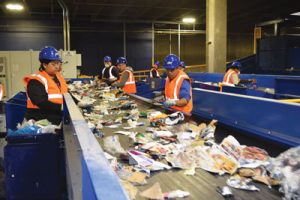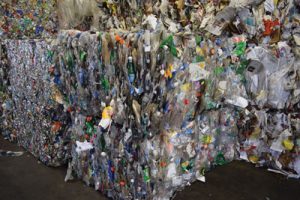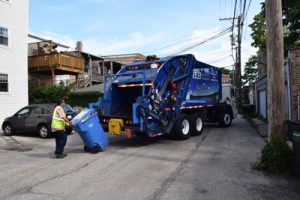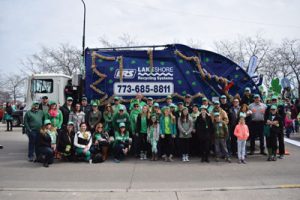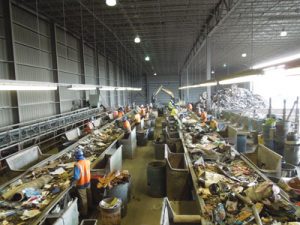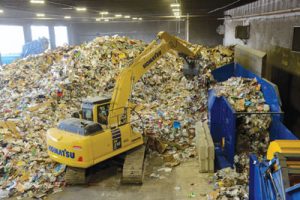With rapid expansion in the Chicago area over the past several years, Lakeshore Recycling Systems has grown to be a force to be reckoned with.
Chicagoland is a tremendous marketplace for businesses with incredible opportunities for growth and expansion—not only for growth in forming a loyal customer base, but also the chance to constantly evolve and elevate business practices. Chicago affords a unique opportunity for many competitors, large and small, to successfully compete. This includes contenders with a business model and capacity that would otherwise completely dominate any other marketplace, and yet work competitively alongside each other in Chicago.
With this unique landscape in mind, Lakeshore Recycling Systems (LRS) (Chicago, IL) was launched into the competitive landscape of waste and recycling; it is a company in its infancy when compared to the other industry veterans of the area, which are still present and actively working in the Chicagoland marketplace over 50, 75, even 100 years later. Though the daunting task of name recognition, outstanding service and customer loyalty is paramount to the survival of new waste haulers, the two companies that make up Lakeshore Recycling Systems have not only survived, but also thrived in this extremely competitive landscape.
Before Lakeshore Recycling Systems became the $130M company that it is today, it began as two separate and smaller entities in the Chicagoland area—each becoming experts in different services. Recycling Systems, Inc. (RSI), was started in 1999 by a family wanting to provide more comprehensive roll-off services in Chicago. Housed on Chicago’s Southside, the Golf family recognized that there was a need for dependable roll-off services, which are generally used for construction and demolition sites, home renovations, as well as commercial sites. They determined that the best way to change the industry was to form their own company. As RSI began its journey of successfully changing the roll-off service industry to fit Chicago’s needs, the company evolved its business into running a successful Material Recovery Facility (MRF) that today is one of six run by Lakeshore.
Meanwhile, as RSI expanded, another industry leader emerged in 2001, Lakeshore Waste Services (LWS). The company provided a new service option for commercial and residential customers and quickly expanded due to customer loyalty, integrity in providing the best service possible and its relentless stance on protecting the environment; today those core values form the LRS mission statement. With both LWS and RSI excelling rapidly in key segments of the waste and recycling industry, the two companies realized the value they could create for both customers and stakeholders by merging the two companies. Accordingly, Lakeshore Recycling Systems was formed in January 2013, generating revenue in excess of $58M with 220 employees and operating one MRF on the south side of Chicago.
Right after the merger, Lakeshore purchased Exchange LLC in the Stockyards neighborhood of Chicago. Exchange is a C&D facility that process more than 500 tons of heavy C&D material a day and employs 60 individuals in direct operations.
In June 2014, Lakeshore expanded its footprint yet again with the purchase of Heartland Recycling in Forest View on the outskirts of Chicago. “It is important to note that since purchasing the Heartland facility, we have fully renovated the internal structure of the facility, adding over 5 acres to the plant, and in March of this year, commissioned a cutting-edge single-stream facility there,” says Alan T. Handley, CEO of Lakeshore Recycling Systems.
Heartland catapulted Lakeshore’s headcount to 600 employees with the upgraded facility and added more than 100 new jobs in Cook County. Not available anywhere else in greater Chicago, the new 40,000 square-foot single-stream recycling system harvests more than 110,000 tons of high-grade residential and commercial single-stream recyclables, and sorts, separates and allocates more than 20 tons of waste per hour. Heartland’s single-stream technology recycles paper, cardboard, glass, aluminum, ferrous metals, such as steel and #1-#7 rigid plastics. Rigid plastics #1-#7 include items such as soda bottles (#1) and milk jugs (#2), not to mention the #3-#7 hard-to-recycle plastics, such as plastic bags (#4).
To grow its Chicagoland operations, which currently controls approximately 32 percent of Chicago’s outbound waste, Lakeshore purchased a sixth facility in the northern Chicago suburb of Northbrook, C&D Recycling in March of this year. C&D had specialized in construction and demolition waste, something Lakeshore leveraged and then expanded to form an even more competitive presence in the northern Chicago collar counties. This facility solidifies Lakeshore’s growth in Chicago and enables the company to control and process more than 2 million tons of waste material annually, more than any other privately-held company in Illinois. With the acquisition of C&D, LRS now runs more than 190 packer, roll-off and transfer trucks in addition to nearly 80 pieces of heavy yellow iron.
Today, LRS serves all 605 Chicago public schools, eight area city colleges of Chicago sites and is expanding aggressively in Chicago’s North Shore, where it became the first waste and recycling company to introduce organic recycling in Illinois. Organic recycling combines landscaping and food waste that LRS turns into compost. Lakeshore serves residences and businesses in Chicago, Winnetka, Glencoe, Highland Park, Highwood, Deerfield, Bannockburn, Riverwoods, Evanston, Skokie and Golf, and anticipates continued growth throughout Chicago’s collar counties.
Dominating the Marketplace
Only three years since the merger, Lakeshore has dominated the marketplace through innovative diversion and recycling programs, technology advances in service delivery, exceptional customer service and upholding a strong awareness and responsibility for the environment. “No one else in the market is as vertically integrated as we are or as heavily invested in diverting waste. We take great pride in successfully diverting over 800,000 tons out of the waste stream each year,” says Handley.
Unlike its peers, and by choice, Lakeshore does not own a landfill, a bold and unconventional decision in the industry. When RSI and LWS first merged to create LRS, they didn’t have a landfill asset, however management did consider a landfill acquisition. As they looked through it more closely, they determined that by buying a landfill and getting involved in that end of the waste business it had the potential to destroy a fundamental pillar of their strategic plan. Says Handley, “We quickly realized that it was not congruent within our core mission, which is to recycle and divert waste. Diverting material out of the waste stream is at the core of the circular operating model on which Lakeshore was founded. By devoting all of our resources to recycling and diversion we are not only growing profitability, but also serving as a responsible steward of environmental sustainability. Pursuing a landfill would have forced us to divert resources away from our core strategy.”
At its facilities, Lakeshore uses a variety of methods to facilitate the sorting and diversion process: parallel sort systems with integrated shaker screens, magnets and in-line shredding capabilities. Skilled operators work on the various sorting lines and are assigned a different commodity, such as brick, lumber, plastics and metal. Once that material is physically sorted it is ultimately transported to the appropriate end user.
Handley emphasizes that the organic recycling process is still in its infancy in Chicago and is a burgeoning business model that he and his team will continue to explore. Handley and other members of the LRS executive management team will visit South Korea this summer to look at new organic recycling technologies being rolled out in varied commercial applications. Handley added that one company his team will be visiting owns 65 commercial sites in South Korea operating on an industrial scale. This company produced smaller units for LRS to work with, and preliminary testing shows great promise. The larger commercial units take in 15 tons of MSW food scrap/material and process it down to just three tons of organic compost in less than 24 hours. Comparatively, Lakeshore controls more than 100 tons of food waste per day from stores, markets, food manufacturers or large restaurant or hotels. “We plan to go a step further and keep this material onsite and to put it through this composting system. By doing so, we hope to create over 30 tons of compost a day and keep 100 tons of food waste out of landfills. If we marketed this composting model in Chicagoland, we strongly believe the amount of food waste we could control would grow significantly above the 100 tons a day that we control today.”
Internal Operations
Since its inception in 2013, Lakeshore’s customer service center has expanded three-fold to accommodate its rapidly growing customer base. Since 2013, the number of Lakeshore customers has grown from just under 7,000 to more than 25,000 today. Service representatives have been trained to address any issue that may arise. The expanded Lakeshore sales team also has been extensively trained in customer interaction and retention, focusing on a high degree of mutual respect and resolving any challenges. Extensive company-wide training is a large step in promoting the service conversation and building trust between customers, pipeline customers and Lakeshore as a whole. “We strive to be transparent to build confidence in our brand. Lakeshore does not believe in hidden business practices or keeping silent on compelling industry news; we take immense pride in our work and share that openly through our easy-to-navigate Web site, active engagement on social media networks and a quarterly newsletter published quarterly, all of which have expanded significantly in the last year.”
Lakeshore’s social media pages guide viewers in core Lakeshore values, industry trends and ways to assist in providing sustainable practices for day-to-day living. The company’s transparency is also evidenced in an innovative billing service, giving customers a portal to check service levels, pay bills and manage their services more easily and efficiently.
Hiring only the most experienced drivers, Lakeshore puts new drivers through a series of skill progression tests and drug tests as part of a rigorous evaluation process that includes having route auditors follow them on their routes until such time as both the driver and the supervisor deems necessary. These route auditors are also assigned to existing drivers who may be having problems, such as a higher-than-normal incident rate of both near misses and actual accidents. If someone has an incident, such as damage to a truck or compactor, Lakeshore assigns a route auditor and the safety managers get involved. This helps the affected drivers get the training, help and support they need as soon as possible.
Lakeshore maintains and promotes a continuous focus on safety. Safety remains the company’s biggest internal and cultural initiative that helps everyone operate safely on jobsites, in neighborhoods, in the office, in recreational activities and in leading safer lives. The company also has safety programs for line workers. During new hire periods, they are required to wear a green hard hat that shows everyone that they are new so people can keep an eye on them with the idea that safety is a collective responsibility. As new hires progress and earn more than 2,000 documented safe hours, they are elevated to the next hard hat safe color with blue being the highest level (at over 8,000 safe hours). The employees in the blue hats are in charge of people wearing newer helmets, looking after them and creating a peer bonding system as well. Handley said LRS also offers formalized training on what clothing should be worn on the line and how to handle dangerous items like hypodermic needles. “They have to go through a rigorous and formal training process before they are released to go into a general work environment.”
Lakeshore has taken the initiative to expand the company safety program for internal operations, hiring a Safety Director to facilitate problem-resolution and provide preemptive steps to stabilize any potential issues that may arise. “When we merged three years ago, safety was taken on by the owners. As we began to expand, the level of activity and the number of sites seem to grow exponentially, so the need to double down on safety was critical,” says Handley. As a result, Lakeshore brought on a Safety Director from Granite Construction who started leading some of the safety programs. Although many of them were in place, they just weren’t documented as well or as formally as they are today.
Now the staff has regular safety breakfast meetings at 3a.m. every week and manger safety meetings are held to reinforce the message that safety starts at the top and works its way throughout the organization. He continues, “Supervisors and managers really influence safety more than a bottom-up approach. Having guys in the field training others is more important than just training the individual alone. We put a big emphasis on training the managers and telling others to keep an eye out for each other.”
Lakeshore strives to uphold these important values that are rooted firmly in the heart of each employee and anchored in the mission statement displayed prominently throughout the company’s work sites. Lakeshore employees have dedicated themselves to being a positive part of the community, expanding in recent years to include participation in Chicago-area neighborhood parades and community events. Lakeshore also has invested heavily in advertising in the communities and neighborhoods where it does business.
One way Lakeshore has excelled in creating and maintaining a positive image is to promote volunteering in the community and even forming a partnership with key charities, such as Special Olympics Illinois, Make-a-Wish Illinois and Lupus Illinois, not to mention smaller scale efforts with area schools and various not for profit organizations. “Overall, Lakeshore Recycling Systems takes pride in our company and the many ways we stand out in comparison to our competition,” explains Handley. “Through our dedicated efforts to improve the customer experience with transparency, innovation, environmental conservation and safety, we make a positive impact on the community, as well as set a high standard as a successful business model.”
Facing Challenges
As Lakeshore viewed the composition of its customer base, it became apparent that most of its revenue and profit was being driven from temporary roll-off work or from its MRFs. While these revenue streams are critical to Lakeshore’s mission, it presented a dilemma in that most of this work was unpredictable and might be impacted by down turns in different segments of the Chicago economy (such as construction activity). So approximately two years ago, Lakeshore began investing more heavily in residential and permanent commercial work to achieve a better balance between recurring contractual revenue and revenue derived from temporary roll-off and MRF business. “We needed to have communities and businesses that presented the opportunity to forge longer term relationships than some of the more temporary roll-off work or MRF business. Since we launched that initiative in the Spring of 2013, we have been fortunate to have won the trust of many towns and municipalities: Golf, Bannockburn, Skokie, Deerfield, Glencoe, Winnetka, Highland Park and Highwood, all of which were not customers three years ago,” says Handley. “Residential service and permanent roll-off has doubled in both sales and volume over the last three years, leading to the company achieving a healthier balance in the composition of its revenue base. When I look at the composition of our revenue today versus three years ago, it is more balanced, and as a result, the company is not as susceptible to market forces that are frankly out of our control, such as a downturn in the construction or commodity markets.”
Handley has to constantly evaluate where Lakeshore will go from this point. The company has grown from $60 million dollars in sales three years ago to approximately $130 million today, and there are 650 employees currently versus the 220 on staff three years ago—so what is the next step? Handley says he spends a lot of his time and energy developing growth strategies that incorporate both a heavy emphasis on organic growth, but also stress intelligent acquisition and geographic expansion. Operating from its Chicago-based headquarters, Lakeshore faces a challenge in that there has been a lot of consolidation in the marketplace and not many large opportunities to grow through acquisition. As a result, he believes that the company will continue to focus on organic growth as a primary driver, a direction that takes a lot of time, capital and patience.
“We have many big bold ideas in our strategic plan and are continually evaluating options that cover the spectrum, from adding new single stream resources to our product offering all the way to transplanting our unique and circular recycling-based model to other markets,” says Handley. “We believe that we have a compelling, game-changing business model that is critical to building the circular economy, and we strongly believe that we are at a point in our evolution that it is likely we will push that model outside the Chicagoland market.”
Handley added he is most proud of what Lakeshore has been able to do with its brand. “I am so proud of our ability to grow to where we are today—building relationships in the communities we serve and building a real market presence. Before, we didn’t have the scale to be a major player in some of these areas. With the merger, our commitment to customers and a vigorous attention to environmental innovation and sustainability, we can head into any bid and be seriously considered, more often than not coming away with a new customer or community. We have built Lakeshore into a rock-solid company all from our world class talent, operational excellence and state-of-the-art fleet and facilities.”
Transforming Lakeshore Recycling Systems
Currently, Lakeshore has three companies it views as possible acquisition targets as Handley and his team get ready to visit South Korea to evaluate the new composting technology. Handley believes bringing South Korean composting technology to Chicago will be a true game changer for the company and Chicago. “It would enable us to compost 100 tons or more of food waste per day, dramatically impacting the company’s bottom line and hopefully changing the way Chicago handles food waste.”
He continues, “We are going to continue to push our footprint in Chicagoland. While many technological innovations can be used to expand traditional lines of business, we will continue to vet, evaluate and pursue acquisition targets. We have been particularly successful developing a culture of passion around our growth, and all of us believe in the disruptive force we hold today in reinventing Chicago’s waste and recycling market. I have the most passionate group of employees and partners here at Lakeshore. They live and breathe this industry and I couldn’t be more proud; it’s been a phenomenal three years and we are only getting started.” | WA
For more information, contact Alan Handley at [email protected].
Lakeshore’s growing fleet can be seen across Chicagoland as it continues to expand services, including an extensive roll-off division.
Photos courtesy of Lakeshore Recycling Systems.
